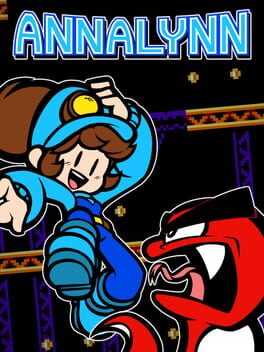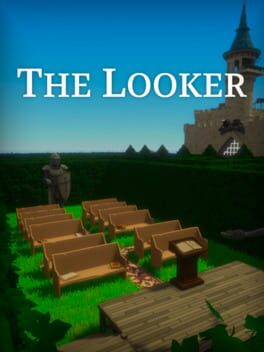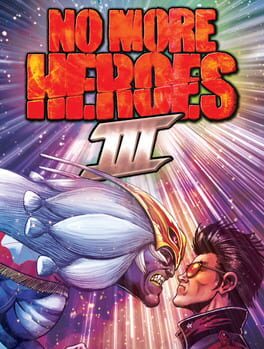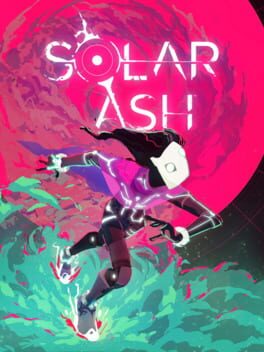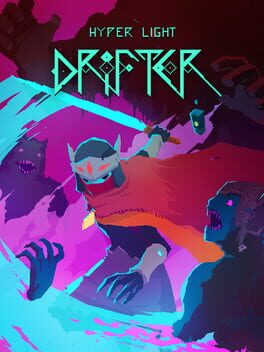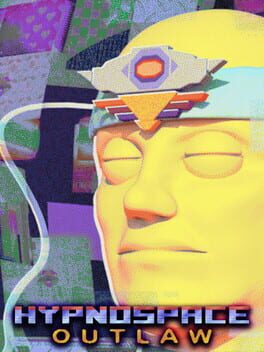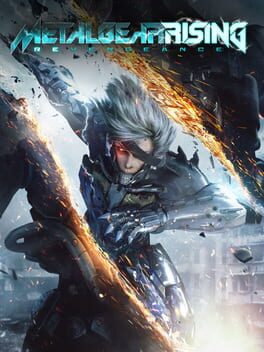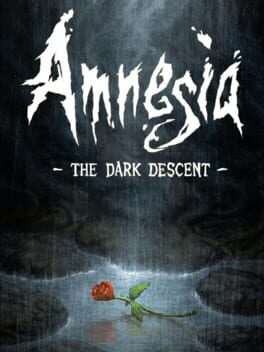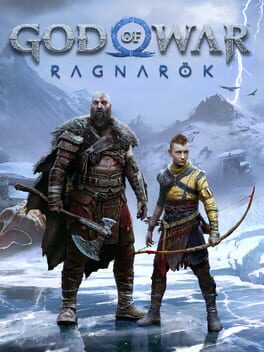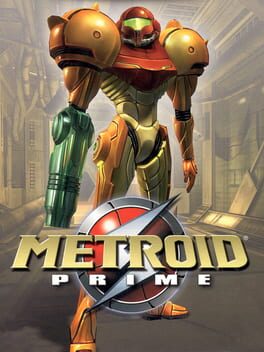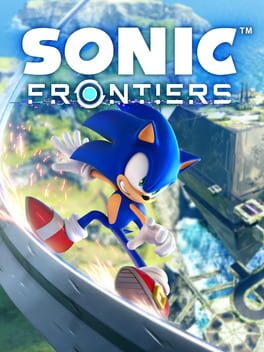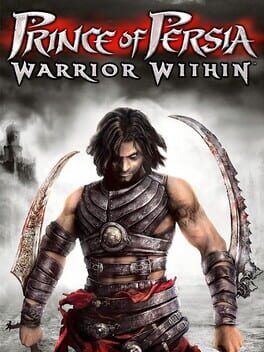Gerborious
2021
Annalynn has become my go to game when I don't have a lot of time. Over the last few weeks, I've found myself playing a round before bed, or before starting on my work for the day. It's fun to play, has the perfect length to incentivize mastery on further playthroughs, and expertly manages to interpret what made arcade classics fun. It's oddly inspiring, I want to try and see how a game like Dig Dug could be evolved like this game did for Pac Man.
2022
2021
No More Heroes III is kept on a razor's edge between absurdism and mundanity. There are frequent, extreme tonal shifts and style changes. However, most of the game is spent fighting the same batch of enemies in the same batch of arenas.
Load a fight.
Kill the enemies.
Drive to another fight.
Find a generic collectable along the way for a dopamine hit.
Load a fight.
Kill the enemies.
Enter the boss fight.
Watch a cutscene about the conventions of role playing games.
Serialized TV outro.
Netflix.
Miike.
No More Heroes III.
Is it all worth it?
Load a fight.
Kill the enemies.
Drive to another fight.
Find a generic collectable along the way for a dopamine hit.
Load a fight.
Kill the enemies.
Enter the boss fight.
Watch a cutscene about the conventions of role playing games.
Serialized TV outro.
Netflix.
Miike.
No More Heroes III.
Is it all worth it?
2021
I really wanted to be that guy for Solar Ash, the one person who champions a piece of media that received a fairly middling reception. Unfortunately, my feelings for it are much more, well, middling. If you were to take a scan of my brain, and somehow generate a game out of it, Solar Ash wouldn't be very far off. In concept, this game owns, but in practice it needs a lot more work.
The biggest mark against the game is a lack of mechanical progression. I had a moment during the final boss where I wondered whether the platforming I was doing was meaningfully more difficult than the platforming for the first boss. The spectacle has been enhanced, absolutely, but with how the game handles the majority of the steering and pathfinding to compensate for the massive shifting landscape, I don't believe the challenge had been meaningfully heightened.
Solar Ash has many of Hyper Light Drifter's qualities. The visual design is immaculate, same with the soundtrack. The control of your character is fun, responsive, and satisfying. The areas you explore are wonderfully designed, and sized perfectly to encourage exploration, with how fast you move. What Solar Ash lacks in comparison to Hyper Light Drifter, is a solid challenging core. HLD's combat was consistently engaging and challenging, ramped up over the course of the game, and had different ways for the player to express themselves through build options. Solar Ash's platforming doesn't stand up to this standard.
The biggest mark against the game is a lack of mechanical progression. I had a moment during the final boss where I wondered whether the platforming I was doing was meaningfully more difficult than the platforming for the first boss. The spectacle has been enhanced, absolutely, but with how the game handles the majority of the steering and pathfinding to compensate for the massive shifting landscape, I don't believe the challenge had been meaningfully heightened.
Solar Ash has many of Hyper Light Drifter's qualities. The visual design is immaculate, same with the soundtrack. The control of your character is fun, responsive, and satisfying. The areas you explore are wonderfully designed, and sized perfectly to encourage exploration, with how fast you move. What Solar Ash lacks in comparison to Hyper Light Drifter, is a solid challenging core. HLD's combat was consistently engaging and challenging, ramped up over the course of the game, and had different ways for the player to express themselves through build options. Solar Ash's platforming doesn't stand up to this standard.
2016
Many adventure games are about exploring dead kingdoms. Navigating a once living corpse, roads acting like veins, drained of blood. What makes Hyper Light Drifter unique to me though, is that the wounds feel fresh. Hallownest and Lordran feel long dead, to the point where the actual amount of time that has passed feels irrelevant. The world of Hyper Light Drifter seems so much more violent because of this. We don't see the violence directly, sure, but the corpses still lay on the ground, undisturbed until we desecrate their resting place with more bloodshed. Violence is the natural state for some people, their bodies rebelling against themselves. Malfunctions become self-sabotage when viewed from the first person perspective. How can someone find peace in this cycle? Is it even possible? I don't know, I'm not a philosopher.
2019
I really wish that I loved this more than I did. It's ultimately on me, I knew a lot of the iconic moments coming in so it makes sense that it was ultimately less impactful. There also may be something to the fact that I have absolutely zero experience with this era of the web. I wonder if we'll ever see completely faithful recreations of the early 2010's internet?
After years of waiting and hours spent playing the games leading up to it, I finally got to play Metal Gear Rising. Honestly, I thought it would be better? There is a great action game in here, but a couple of factors I found lacking.
Firstly, I was really underwhelmed by the level design. Aesthetically, they are very 7th gen; gray and brown are the primary color palette. There are breaks from this, (the Japanese garden) and there are times where it works, (the dusty highway duel between Raiden and Sam) but the locations of this game have already begun to slip from my mind. It doesn't help that the levels are very simple mechanically. Rising is a very pared back Platinum game, and this may be a benefit for many people. Personally, the moments of brief puzzles, platforming, or minigames really add to an action game for me. The lower intensity moments help add to the electrifying combat. Rising does have brief moments where it lets the player look for collectables, but the campaign is laser focused on the core combat.
Speaking of said combat. It's solid, but there are things I found disappointing. The biggest issue for me is the menu system. Not every game needs to be Devil May Cry, and have every option available all at once, but the secondary weapons you can switch to are underwhelming. Mistral's staff is great, but Monsoon's sai and Sundowner's blades both felt disappointing. The sai really is the most sad piece of this. If there was a way to quickly swap I would be using it all the time, but giving up over half of your combo list for a tether just didn't feel worthwhile. Luckily, Raiden's parry and Zandatsu both feel great to pull off through the entire game. I think what I was most disappointed with were the enemies. Rising is one of those unfortunate action games where a lot of the more unique foes weren't fun to fight. Especially when it comes to projectiles. On the other side of the coin, the bosses were consistently fantastic! The music is energetic, and learning their combos were really fun.
One final thing to touch on, and it's the story. Rising's story has been absolutely regurgitated through memes. It's still fun, but I think certain moments lost their impact on me. The game is also extremely short? Even for one of these games it's really thin.
Overall it gets a thumbs up from me. It's a pretty middle of the road Metal Gear game, and a middle of the road Platinum game. Funny how that works out.
Firstly, I was really underwhelmed by the level design. Aesthetically, they are very 7th gen; gray and brown are the primary color palette. There are breaks from this, (the Japanese garden) and there are times where it works, (the dusty highway duel between Raiden and Sam) but the locations of this game have already begun to slip from my mind. It doesn't help that the levels are very simple mechanically. Rising is a very pared back Platinum game, and this may be a benefit for many people. Personally, the moments of brief puzzles, platforming, or minigames really add to an action game for me. The lower intensity moments help add to the electrifying combat. Rising does have brief moments where it lets the player look for collectables, but the campaign is laser focused on the core combat.
Speaking of said combat. It's solid, but there are things I found disappointing. The biggest issue for me is the menu system. Not every game needs to be Devil May Cry, and have every option available all at once, but the secondary weapons you can switch to are underwhelming. Mistral's staff is great, but Monsoon's sai and Sundowner's blades both felt disappointing. The sai really is the most sad piece of this. If there was a way to quickly swap I would be using it all the time, but giving up over half of your combo list for a tether just didn't feel worthwhile. Luckily, Raiden's parry and Zandatsu both feel great to pull off through the entire game. I think what I was most disappointed with were the enemies. Rising is one of those unfortunate action games where a lot of the more unique foes weren't fun to fight. Especially when it comes to projectiles. On the other side of the coin, the bosses were consistently fantastic! The music is energetic, and learning their combos were really fun.
One final thing to touch on, and it's the story. Rising's story has been absolutely regurgitated through memes. It's still fun, but I think certain moments lost their impact on me. The game is also extremely short? Even for one of these games it's really thin.
Overall it gets a thumbs up from me. It's a pretty middle of the road Metal Gear game, and a middle of the road Platinum game. Funny how that works out.
God Amnesia falls off so hard partway through and it makes me actively sad. Trust me, for the first few hours, the atmosphere was killing me, I was in the palm of Frictional Game's hand, and they could do whatever they felt like. For example, the section with the iconic water monster was still extremely tense for me, despite the fact that every person on the internet knows how it works.
Unfortunately, the tension of Amnesia is simply an extremely thin veil. Death has no actual consequence, and when I realized that, the tension drained away as quickly as it was built up. Funnily enough, making the game more mechanically dense also makes it more immersive for me, especially in a horror context.
At the end of the day, skill put into the atmosphere should absolutely be commended, and I think the game is really good outside of the lack of punishment. I really enjoyed managing my light, and would love to see other games that play with the concept. Though, small request, maybe don't make the screen look like vomit whenever a monster comes by, or for any reason really?
Unfortunately, the tension of Amnesia is simply an extremely thin veil. Death has no actual consequence, and when I realized that, the tension drained away as quickly as it was built up. Funnily enough, making the game more mechanically dense also makes it more immersive for me, especially in a horror context.
At the end of the day, skill put into the atmosphere should absolutely be commended, and I think the game is really good outside of the lack of punishment. I really enjoyed managing my light, and would love to see other games that play with the concept. Though, small request, maybe don't make the screen look like vomit whenever a monster comes by, or for any reason really?
2022
Ragnarok improves upon the 2018 game in a lot of really strong ways. Enemy variety is way more pronounced, loot rarity has been removed so that the RPG mechanics are allowed to breathe, and the plot has a stronger forward momentum.
However, this only goes to show how the foundation that this game was built upon was rough. The combat is better, but the camera is still a constant issue. In most cases, I found it to actually be worse than in 2018. Additionally, the games lack of any meaningful gameplay outside of combat makes the campaign much harder to fully experience. Eventually I just got bored and turned down the difficulty from hard to normal.
All in all, this games achievements outnumber it's missteps. I'm sure that part of my struggle of finishing this game was because I started near immediately after replaying the first. In the end though, I think it was worth the time I spent with it.
However, this only goes to show how the foundation that this game was built upon was rough. The combat is better, but the camera is still a constant issue. In most cases, I found it to actually be worse than in 2018. Additionally, the games lack of any meaningful gameplay outside of combat makes the campaign much harder to fully experience. Eventually I just got bored and turned down the difficulty from hard to normal.
All in all, this games achievements outnumber it's missteps. I'm sure that part of my struggle of finishing this game was because I started near immediately after replaying the first. In the end though, I think it was worth the time I spent with it.
This review contains spoilers
Metal Gear Solid 4 is extremely sad. It's a story of a man who was manufactured to fulfil a role he doesn't understand, pushing himself further and further past his limit to the edge of death. I really like this, it felt entirely unique to the rest of the series. Certain cutscenes can feel genuinely hard to watch, especially as Snake's condition deteriorates.
This is why I found the final epilogue so disappointing. Big Boss shows up! The entirety of the story was his plan! Turns out Foxdie isn't going to be a problem anymore! In attempting to tie everything together in one neat bow, Kojima managed to have the opposite effect. Maybe I will warm to this over time, but it left me feeling unsatisfied in the moment.
This is why I found the final epilogue so disappointing. Big Boss shows up! The entirety of the story was his plan! Turns out Foxdie isn't going to be a problem anymore! In attempting to tie everything together in one neat bow, Kojima managed to have the opposite effect. Maybe I will warm to this over time, but it left me feeling unsatisfied in the moment.
2002
This sounds stupid, but the biggest thing that Metroid Prime lacks in is progression. Maybe I should say palpable progression? Let me try to explain.
Frankly, the movement in Metroid Prime blows. The double jump is good, but the rest is pretty middling. One of my favorite parts of these types of games is conquering the map through advanced movement. In Metroid Prime, all you really get is the ability to cross larger gaps. This is good, but I wish it was pushed further. The Boost Ball is also there? Hooray?
Another big aspect of Prime's underwhelming progression are the boss fights. They are so extremely lame it hurts. The designs are so cool I just wish they were 60% shorter and 90% less repetitive and 40% more aggressive. It doesn't feel good to explore, and find mostly combat related upgrades, only for their application to be utterly banal. Why should I care about finding missiles when I know that every time I hit Meta Ridley with one, he'll just go into a canned 20 second flight animation, sometimes multiple times in a row?
Finally, while the map design on a micro level is immaculate in both visual and level design, on a macro level it falls apart quick. Look, the big issue is Magmoor ok? I feel like so much of my time was spent walking back and forth through that same linear part of the map. Admittedly, this could be more due to me being unfamiliar with the optimal routes to pickup upgrades, so this could get better with more playthroughs.
This game has acted as a sort of mental block for me since I finished it last month. Once my life opens up, and I finish the other games I'm currently playing through, I plan on going back and doing a complete new game plus, hard mode playthrough. Consider this a rough draft of my opinions.
Frankly, the movement in Metroid Prime blows. The double jump is good, but the rest is pretty middling. One of my favorite parts of these types of games is conquering the map through advanced movement. In Metroid Prime, all you really get is the ability to cross larger gaps. This is good, but I wish it was pushed further. The Boost Ball is also there? Hooray?
Another big aspect of Prime's underwhelming progression are the boss fights. They are so extremely lame it hurts. The designs are so cool I just wish they were 60% shorter and 90% less repetitive and 40% more aggressive. It doesn't feel good to explore, and find mostly combat related upgrades, only for their application to be utterly banal. Why should I care about finding missiles when I know that every time I hit Meta Ridley with one, he'll just go into a canned 20 second flight animation, sometimes multiple times in a row?
Finally, while the map design on a micro level is immaculate in both visual and level design, on a macro level it falls apart quick. Look, the big issue is Magmoor ok? I feel like so much of my time was spent walking back and forth through that same linear part of the map. Admittedly, this could be more due to me being unfamiliar with the optimal routes to pickup upgrades, so this could get better with more playthroughs.
This game has acted as a sort of mental block for me since I finished it last month. Once my life opens up, and I finish the other games I'm currently playing through, I plan on going back and doing a complete new game plus, hard mode playthrough. Consider this a rough draft of my opinions.
2022
Sonic Frontiers may be the happiest I've ever been about feeling that a game is pretty good.
I'll be honest, I was a complete doubter when it was first revealed. I thought that the aesthetic was poor, the game looked incredibly buggy, and that placing Sonic in an open area was a risky idea. After playing it, all of my worries were correct! The Starfall Islands are visually underwhelming, which isn't helped by the garish rails and platforms that litter the landscape and sky with some of the worst pop in I've ever experienced. The game is incredibly buggy, if Sonic hits a rock at a wrong angle, he will launch off into the air, sometimes ruining your attempts to use the Cyloop. Placing Sonic into an open area was a risky idea.
Luckily, I think that risk payed off.
Sonic Frontiers, warts and all, was one of the most fun experiences that I have had this year. Ultimately, this game is Sonic's first real stab at the 3D Collect-a-Thon formula. The main levels are dotted with boost pads, rails, springs, short missions, and linear platforming stages. In terms of the amount of collectables, and the mechanical intrigue of actually collecting them, Sonic Frontiers should be one of the worst Collect-a-Thons of all time. There are an absurd amount of collectables, and the vast majority of them are gained from the least interesting tasks imaginable.
Sonic has something unique though, his speed. In the worst of 3D Collect-a-Thons, it can take ages to comb through a stage for all the trinkets, and boring minigames can take minutes of your time, bringing the pacing to a screeching halt. In Sonic Frontiers however, the most menial of missions last only moments.
You start off using the games movement to launch Sonic off a slope into the end of one platforming challenge, before using a homing attack cancel to soar and land into an entirely separate collectable, finally landing back on the ground on top of a quick puzzle. Throw in some more involved moments into the mix like short boss fights, narrative segments, focused platforming stages, and fishing. Cap it all off with a mechanically simple, but enthralling boss fight. That is a killer formula.
I was genuinely positively surprised by Sonic Frontiers. If the next game that Sonic Team makes follows up on this formula, then consider it one of my most anticipated games for the next few years.
I'll be honest, I was a complete doubter when it was first revealed. I thought that the aesthetic was poor, the game looked incredibly buggy, and that placing Sonic in an open area was a risky idea. After playing it, all of my worries were correct! The Starfall Islands are visually underwhelming, which isn't helped by the garish rails and platforms that litter the landscape and sky with some of the worst pop in I've ever experienced. The game is incredibly buggy, if Sonic hits a rock at a wrong angle, he will launch off into the air, sometimes ruining your attempts to use the Cyloop. Placing Sonic into an open area was a risky idea.
Luckily, I think that risk payed off.
Sonic Frontiers, warts and all, was one of the most fun experiences that I have had this year. Ultimately, this game is Sonic's first real stab at the 3D Collect-a-Thon formula. The main levels are dotted with boost pads, rails, springs, short missions, and linear platforming stages. In terms of the amount of collectables, and the mechanical intrigue of actually collecting them, Sonic Frontiers should be one of the worst Collect-a-Thons of all time. There are an absurd amount of collectables, and the vast majority of them are gained from the least interesting tasks imaginable.
Sonic has something unique though, his speed. In the worst of 3D Collect-a-Thons, it can take ages to comb through a stage for all the trinkets, and boring minigames can take minutes of your time, bringing the pacing to a screeching halt. In Sonic Frontiers however, the most menial of missions last only moments.
You start off using the games movement to launch Sonic off a slope into the end of one platforming challenge, before using a homing attack cancel to soar and land into an entirely separate collectable, finally landing back on the ground on top of a quick puzzle. Throw in some more involved moments into the mix like short boss fights, narrative segments, focused platforming stages, and fishing. Cap it all off with a mechanically simple, but enthralling boss fight. That is a killer formula.
I was genuinely positively surprised by Sonic Frontiers. If the next game that Sonic Team makes follows up on this formula, then consider it one of my most anticipated games for the next few years.
Smells like cigarette smoke and cheap alcohol. Deadly amounts of edge, actively making the experience anti-charismatic. The combat has more "depth", but entirely for the worse. It's fine when you are allowed to platform around, until you are required to redo segments multiple times. Quit during the final boss when I realized that there wasn't anything else in the game that I would likely enjoy.
